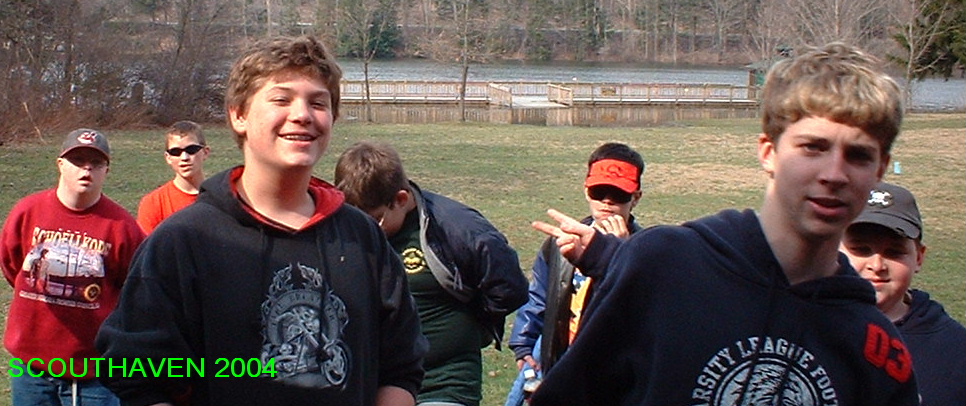|
|
We had great weather for our Recruitment weekend at Camp Scouthaven in Freedom, NY. Here are a few shots I hope you'll enjoy
Scouts from our Troop and six Webelos guests enjoyed a fine spring weekend at one of the Greater Niagara Frontier Council's most beautiful camps. Scouthaven is located south east of Buffalo in Freedom, NY. |
|

Several Scout Skills stations were set up throughout camp for the weekend.
Nick,Below, one of our First Class Scouts teaches and demonstrates some first aid techniques.
|
|
|
|
|
Our Senior Patrol Leader and others
Some of the Troop looks on as one of our Junior Assistant Scoutmasters performs an outdoor cooking demonstration |
Receiving Instruction in the ax yard
One of the highlights of our recruitment campout is to teach the Totin Chip course to Senior Webelos. Here, Marc, one of our young Assistant Scoutmasters, show the proper use and safety of woods tools. |
|
|
|
Lighting our Official 'Scout's Own' candle
Every campout features a Scout's Own service. They run about 20 minutes in length and always happen before or after dinner. We have a great crew of adult leaders who work on the program. |
Patience REALLY IS a virtue
Try to be a PATIENT Leader.
Richard Carlson PhD in his book Don't Sweat the Small Stuff writes, "One of the most important questions you can ever ask yourself is DO I WANT TO BE RIGHT OR DO I WANT TO BE HAPPY. Many times, the two are mutually exclusive!
Being right, defending our positions takes an enormous amount of mental energy and often alienates us from the people in our lives. Needing to be right - or needing someone else to be wrong - encourages others to become defensive and puts pressure on us to keep defending. Yet, many of us spend a great deal of time & energy attempting to prove that we are right and others are wrong. Many people believe that it's somehow their job to show others how their positions, statements or points of view are incorrect, and that in doing so, the person they are correcting is going to somehow appreciate it, or at least learn something. WRONG!
Think about it. Have you ever been corrected by someone and said to the person who was trying to be right THANK YOU SO MUCH FOR SHOWING ME THAT I WAS WRONG AND YOU'RE RIGHT. NOW, I SEE IT, BOY YOU'RE GREAT.
The truth is that all of us hate to be corrected. We all want our positions respected and understood by others. Being listened to and heard is one of the greatest desires of the human heart."
As a Junior Leader in the Troop there will be times when you will be right and wrong about some of the decisions you're making. The important thing is to understand, yourself, that a title or position won't automatically make you brilliant in the course of performing tasks. And correcting someone else is an art form which takes a process of time to learn. So get out there and take your Leadership position one day at a time and from moment-to-moment. That will help you succeed.
|
|
|
|
LEARNING COMPASSION IS AN IMPORTANT ASPECT OF CONFLICT RESOLUTION
Nothing helps build our perspective more than developing compassion for others.
Compassion is a sympathetic feeling and it involves the willingness to put yourself in someone else's shoes. To take the focus off yourself and to imagine what it's like to be in someone else's predicament and, at the same time, to feel love for that person. IT'S THE RECOGNITION THAT OTHER PEOPLE'S PROBLEMS, THEIR PAIN AND FRUSTRATIONS, ARE EVERY BIT AS REAL AS OUR OWN - AND OFTEN FAR WORSE. In recognizing this fact and trying to offer some assistance, we open our hearts and greatly enhance our sense of gratitude.
Compassion is something you can develop with practice. It involves two things:
INTENTION
ACTION
Intention simply means you open your heart to others. You expand who and what matters from yourself to other people.
Action is simply what you do about it
These are good techniques and good things to think about when handling conflict as a leader in the Troop.
---Credit must be given to Richard Carlson PhD and his writings as the inspiration in preparing this piece on using Compassion as a tool in Conflict Resolution.
|
|
|
|
|
|
|
|
|
|
|
|
|
|
|
|
|
|
|
|


